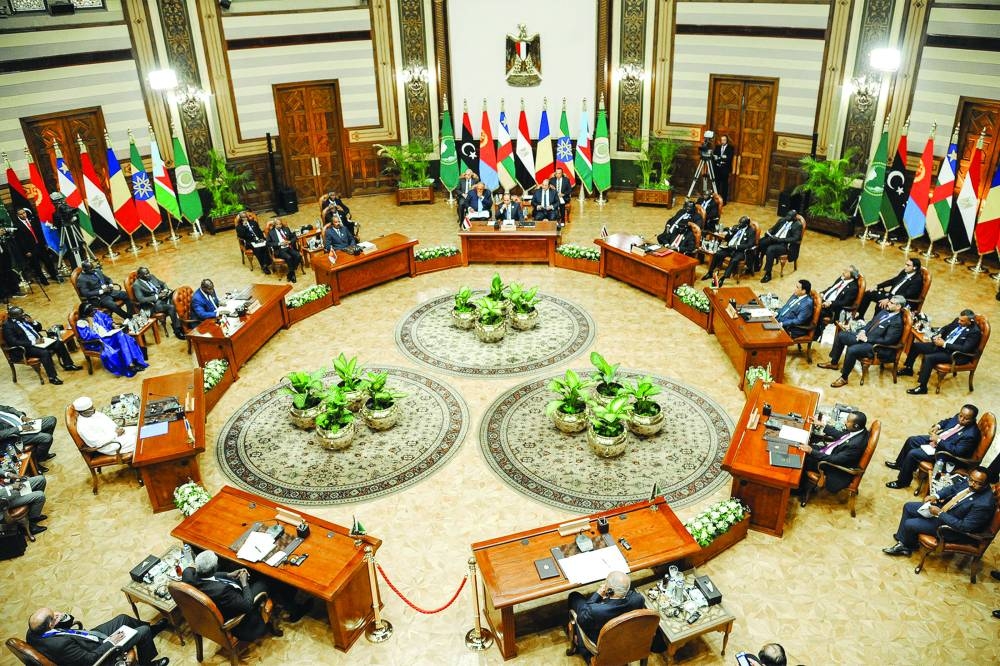A summit of African leaders from war-torn Sudan’s neighbours has urged an end to the fighting, as UN experts reported a mass grave had been discovered in the country’s Darfur region.
In a joint statement, the leaders of Sudan’s seven neighbours called on the warring parties to commit to a ceasefire, appealed to regional states not to interfere in the conflict, and agreed to facilitate delivery of aid.
They also warned of the possibility of Sudan’s fragmentation or “descent into chaos that could lead to the spread of terrorism and organised crime,” and called on the international community to meet aid pledges made last month.
While Cairo hosted the crisis meeting on the nearly three-month-old conflict, gun battles, explosions and the roar of fighter jets again shook the Sudanese capital Khartoum.
At least 3,000 people have been killed and millions have fled their homes in the war between Sudan’s rival generals, according to the Armed Conflict Location and Event Data Project.
Leaders of Egypt, Ethiopia, Eritrea, Chad, South Sudan, Central African Republic and Libya as well as of the African Union and Arab League met in Cairo to discuss the war and its regional impact.
The United Nations has warned that Sudan’s conflict risks spiralling into “a full-scale civil war, potentially destabilising the entire region”.
Egyptian President Abdel Fattah al-Sisi hailed the “noble efforts” of Sudan’s neighbours in “receiving hundreds of thousands of refugees with limited resources in an extremely difficult global economic situation”.
“All of our brothers in Sudan must uphold the supreme interest and keep Sudan’s politics and unity away from external interference that seeks to achieve narrow interests,” al-Sisi told the summit.
He called on the international community “to honour the commitments” made last month when donors pledged $1.5bn in aid – less than half the estimated need for Sudan and its affected neighbours.
The summit called on both parties to secure corridors for needed aid, even as Sudan’s humanitarian crisis deepened.
Hundreds of people were seen queueing for drinking water in Wad Madani, 200km (130 miles) south of Khartoum, and a 24-hour electricity blackout darkened most of the country overnight.
Since the war erupted on April 15 between Sudan’s army and paramilitary Rapid Support Forces, nearly 724,000 people have fled abroad, according to the International Organisation for Migration (IOM).
The Chadian president, General Mahamat Idriss Deby Itno, said that within “just one week, Chad received more than 150,000 people fleeing the violence”.
The IOM says 240,000 people have escaped to Chad from Sudan’s western region of Darfur, where entire towns have been ransacked.
Yesterday the UN’s human rights office OHCHR reported new evidence of atrocities.
It said the bodies of at least 87 people allegedly killed by the RSF and its allies between June 13-21 were buried in a mass grave in the West Darfur capital of El Geneina near the Chad border.
Some of the victims belonged to the non-Arab Massalit ethnic group, while seven women and seven children were among the dead, the office said, adding that the RSF were “denying those killed a decent burial”.
Sudan’s neighbours – many already mired in economic and political crises – have feared a widening regional spillover since the conflict began.
The president of Egypt, a close ally of the Sudanese army, said that more than 250,000 Sudanese had fled to the northern neighbour, “joining around 5mn Sudanese citizens who have lived in Egypt for many years”.
Human Rights Watch said yesterday that thousands more Sudanese are “stranded in dire humanitarian conditions” on the border, and urged Cairo to “rescind its entry visa rule” which was recently toughened.
Central African Republic’s president, Faustin-Archange Touadera, warned of growing “small arms smuggling” across his country’s “porous border” with Sudan.
“There are severe shortages in food and fuel,” he said, warning of an impending “humanitarian disaster”.
The Cairo summit follows multiple efforts to broker an end to the violence and repeated US and Saudi-brokered ceasefires that were all violated.
The United States and Saudi Arabia had negotiated a series of ceasefires, but suspended talks in Jeddah after violations.
East African regional bloc IGAD held talks on Monday in Addis Ababa calling on the warring parties to “sign an unconditional ceasefire”.
The Sudanese army boycotted the gathering, after Khartoum’s foreign ministry objected to Kenyan President William Ruto’s leadership of the IGAD quartet because it accuses Nairobi of siding with the RSF.
Ethiopian Prime Minister Abiy Ahmed called yesterday for diplomatic efforts to “align with the IGAD-African Union process”, while African Union Commission head Moussa Faki Mahamat urged a “political process without foreign interference”.

This handout picture released by the Egyptian presidency shows participants at the regional summit in Cairo for neighbouring nations impacted by the three-month war between Sudan’s rival generals.
